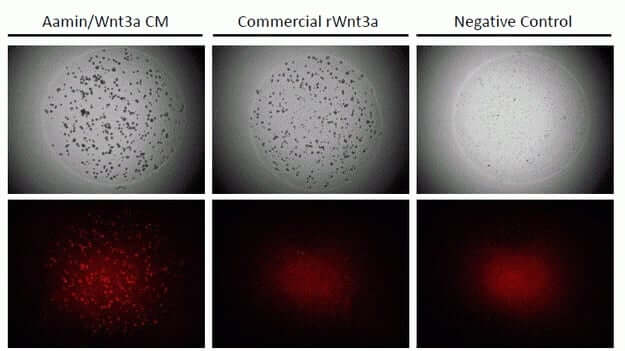Organoid research has revolutionized our understanding of human biology, disease mechanisms, and drug discovery. These three-dimensional tissue structures that mimic real organs have become indispensable tools in modern biomedical research. However, successfully culturing organoids requires precise control of growth factors that maintain stem cell populations—and one of the most critical yet challenging components has been Wnt3a. That's where the breakthrough Afamin/Wnt3a complex comes in, offering a solution that's transforming how researchers approach organoid culture.
Afamin Wnt3a Products from Cosmo Bio
The Critical Role of Wnt3a in Organoid Culture
Wnt signaling is fundamental to stem cell biology, controlling cell proliferation, differentiation, and fate determination during development. For organoid culture, Wnt3a serves as an essential niche component that maintains the proliferation of Lgr5-positive stem cells—the very cells that give organoids their regenerative capacity.
Research has demonstrated that Wnt3a is particularly crucial for:
- Intestinal organoids from small and large intestine
- Stomach organoids
- Pancreatic organoids
- Liver organoids
Without adequate Wnt signaling, these organoids lose their stem cell populations and fail to maintain long-term culture viability.
The Traditional Problem
Despite its importance, traditional Wnt3a preparations have presented significant challenges for researchers:
Solubility Issues
Wnt3a is a highly hydrophobic, lipidated protein that forms aggregates in serum-free medium, dramatically reducing its biological activity. This aggregation problem has made it difficult to achieve consistent results in organoid cultures.
Detergent Toxicity
To maintain Wnt3a in solution, researchers traditionally relied on detergents like CHAPS. However, these detergents present their own problems:
- CHAPS concentrations above 0.25% show cytotoxicity
- Even at "safe" concentrations (0.02%), CHAPS can inhibit stem cell self-renewal
- When diluted into culture medium, detergent concentrations drop and Wnt3a rapidly aggregates
Serum Dependency
Traditional Wnt3a-conditioned medium requires ~10% serum, introducing unknown variables and potential contamination into supposedly defined culture conditions.
The Afamin/Wnt3a Breakthrough
In 2016, researchers led by Dr. Mihara and Prof. Takagi made a groundbreaking discovery that solved these long-standing problems. They identified afamin, a plasma glycoprotein, as the serum component responsible for maintaining Wnt3a in an active, soluble form.
How It Works
The Afamin/Wnt3a complex represents an elegant biological solution:
- 1:1 Complex Formation: Afamin and Wnt3a form a stable 1:1 complex that remains highly soluble in detergent-free buffers
- Maintained Activity: The complex is biologically active, allowing afamin to effectively deliver Wnt ligands to their cellular receptors
- Serum-Free Production: The complex can be produced and stored in completely serum-free conditions
- Enhanced Stability: The complex can be stored at 4°C while maintaining activity
Proven Superior Performance
Collaborative research between leading institutions has demonstrated the superior performance of Afamin/Wnt3a compared to traditional preparations:
Enhanced Stem Cell Maintenance
Studies using organoid strains expressing tdTomato under Lgr5 promoter control showed that Afamin/Wnt3a maintained LGR5-positive stem cell populations at significantly higher levels compared to commercial recombinant Wnt3a at 300 ng/mL concentrations.
Long-Term Culture Success
The Afamin/Wnt3a complex enables long-term organoid culture that was previously difficult to achieve, providing researchers with stable, reproducible experimental systems.
Lower Effective Concentrations
Research confirms that Afamin/Wnt3a maintains stem cell populations even at lower concentrations, potentially reducing costs while improving results.
Available Through CosmoBio USA
Following the transition from MBL International, CosmoBio USA now serves as the primary distributor of Afamin/Wnt3a products in the United States. They offer multiple formulations to meet different research needs:
Product Specifications
- High Concentration Formula: Available as Catalog No. MBL-J2-005-05
- Serum-Free Conditioned Medium: Contains co-expressed mouse Wnt3a and human Afamin
- Ready-to-Use: Simply add to culture media at recommended concentrations
- Quality Controlled: Produced using validated Expi293F™ cell expression systems
Usage Guidelines
For intestinal organoid culture, researchers typically add the conditioned medium at:
- Standard concentration: 10% final concentration
- High concentration formula: 2.5% final concentration
- Optimization recommended: Each application may require specific optimization
Real-World Applications
The impact of Afamin/Wnt3a extends far beyond basic research, with applications in:
Drug Discovery
- Patient-derived organoid drug screening
- Cancer research and therapeutic development
- Toxicity testing with human-relevant models
Personalized Medicine
- Individual patient tumor modeling
- Treatment response prediction
- Precision therapy development
Disease Modeling
- Genetic disease mechanism studies
- Inflammatory bowel disease research
- Liver disease and regeneration studies
The Future of Organoid Research
As organoid technology continues to advance, the availability of high-quality, consistent growth factors like Afamin/Wnt3a becomes increasingly important. The recent FDA decision to allow drugs tested using organoids and other non-animal models to proceed directly to clinical trials underscores the growing importance of robust organoid culture systems.
With CosmoBio USA now providing reliable access to this breakthrough technology, researchers across the United States can take advantage of improved organoid culture success rates, reduced variability, and enhanced experimental reproducibility.
Conclusion
The Afamin/Wnt3a complex represents more than just an improved reagent—it's a paradigm shift that addresses fundamental challenges in organoid culture. By solving the twin problems of Wnt3a solubility and stability, this innovation enables researchers to focus on their science rather than struggling with technical limitations.
For laboratories working with organoids, stem cells, or regenerative medicine applications, upgrading to Afamin/Wnt3a could be the key to unlocking more successful, reproducible, and meaningful research outcomes. As the field moves toward more sophisticated disease modeling and therapeutic development, having access to superior culture conditions isn't just advantageous—it's essential.
Afamin Wnt3a Products from Cosmo Bio
Contact CosmoBio USA to learn more about incorporating Afamin/Wnt3a into your organoid culture protocols and experience the difference that cutting-edge Japanese biotechnology can make in your research.


